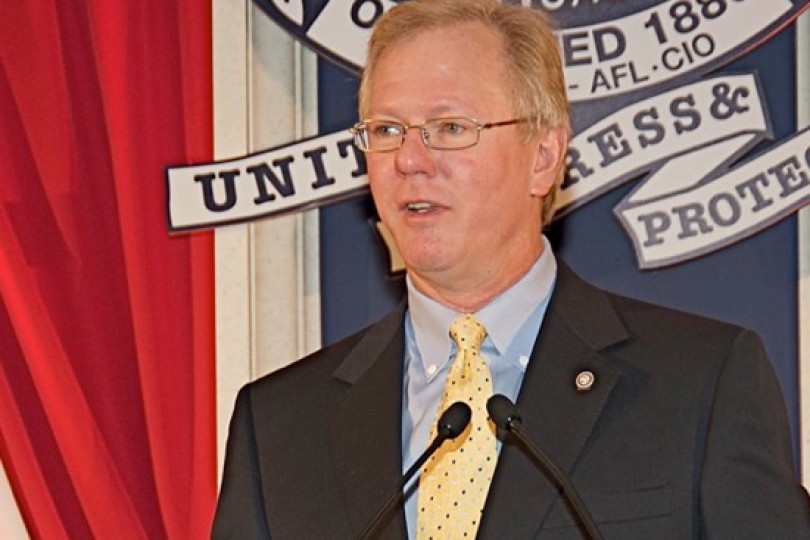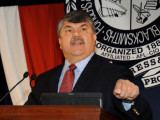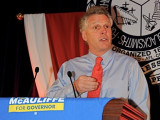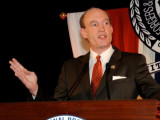At the core of this vitriol remains the Republican Party, voting no, in obstructionist lockstep on the critical issues that face our country.
— IP Newton B. Jones
IP Jones blasts GOP obstructionism
WITH UNEMPLOYMENT still hovering around 10 percent overall (and much higher in the construction industry), it was no surprise that jobs would be a primary focus during the LEAP conference in Washington, D.C., April 25-30. Presenters at the conference took aim at some of the underlying causes of job losses: Wall Street excesses, unfair trade, and partisanship on Capitol Hill.
In his opening remarks, International President Newton B. Jones blasted the GOP for holding up progress on economic recovery.
“The hope and optimism that was felt following the president’s inauguration was followed by a summer of vitriol, partisanship, and general deterioration of our country’s political dialogue,” Jones said. “At the core of this vitriol remains the Republican Party, voting no, in obstructionist lockstep on the critical issues that face our country.”
The conference was punctuated by somber moments of remembrance, as conference participants stood in silent tribute to Charles W. Jones, the Brotherhood’s late President Emeritus, who passed away April 5 in Kansas City, Mo.
Recognizing Workers Memorial Day, which coincided with this year’s LEAP conference on April 28, Boilermakers and guests also paused to remember those who have been killed on the job or who have died from job-related illnesses.
Trumka calls for job creation, financial reform
Investment firms and large banks are “looters of our economy.”
— AFL-CIO President Rich Trumka
AFL-CIO PRESIDENT Rich Trumka delivered a passionate call to put Americans back to work, calling Wall Street investment firms and big banks “looters of our economy,” and outlining a five-step job creation plan.
“Wall Street created this mess,” he said. “They gambled our money on phony financial instruments like subprime mortgages and derivatives and choked off the credit that so many of our employers depended upon. It’s way past time for our country to go back to basics, to making money by making things, real things, not financial fantasies.”
Trumka said the AFL-CIO is calling on Congress and the Obama administration to extend unemployment and COBRA benefits; invest in infrastructure and green jobs; dramatically increase aid to state and local governments; create jobs directly, especially in distressed communities; and to redirect federal TARP funds for loans to small and mid-size businesses.
Trumka railed against Wall Street “suits” who, he said, destroyed 11 million jobs through their recklessness and greed. “We think Wall Street should pay to get those jobs back.” He said creating a financial transaction tax on stocks, bonds, and derivatives would raise as much as $300 billion a year for job creation. He also proposed making hedge funds, private equity funds, and venture capital funds pay taxes at the same rate as American workers to raise more money for job creation.
“We’re fighting for financial reform,” he said. “We’re looking fundamentally for a different kind of economy, an economy that really does work for the working people and not just those at the top.”
McAuliffe pushes for green jobs
It is time for the United States to stop being “chumps,” and start leading the way in alternative energy.
— Former Chairman of the Democratic National Committee Terry McAuliffe
TERRY MCAULIFFE, A successful entrepreneur, former chairman of the Democratic National Committee, and candidate for Virginia governor in the 2009 race, stressed the importance of green jobs to Boilermakers and the U.S. economy.
He said that a recent trip to the Mideast with former President Bill Clinton was an eye-opener. McAuliffe related a conversation he had with Saudi Arabia’s King Abdullah in which the monarch discussed plans to invest $80 billion in his country on wind, solar, and nuclear power — with the goal of becoming 100 percent reliant on alterative energy in six years. McAuliffe said that when he asked Abdullah why such an oil-rich country would do that, the king replied, “Terry, it’s very simple. We use oil internally at $2.74 a barrel. If I’m not using it here, I’m selling it to [the United States] for $85 a barrel. I make more money.”
McAuliffe said it is time for the United States to stop being “chumps,” and start leading the way in alternative energy. He reported that he is forming a new company that will make hybrid and electric cars. “I’m going to put it right in the heart of Virginia,” he said. “And we’re going to have 2,000 folks down there — all of them union members — and show that when you do it right, everybody benefits, including the state of Virginia.”
McAuliffe noted that Virginia has not brought in a manufacturing plant in 15 years, for fear of introducing unions into the state.
LOY Courtney thanks Boilermakers for support
“I will never forget as long as I live the work the Boilermakers did.”
— Rep. Joe Courtney (D-2nd CT)
REP. JOE COURTNEY (D-2nd CT) received the Brotherhood’s 2009 Legislator of the Year Award from IP Jones before addressing the LEAP conference about just how important every vote can be.
Running for his first term in 2006, Courtney won his seat by only 83 votes out of 241,000 cast. “That’s one three-hundredth of a percentage point,” Courtney said. “So anytime I get an invitation to speak to a room that is larger than my margin of victory I’m happy to do so,” he quipped.
On a more serious note, Courtney said that if 42 of those who voted in the election had picked the other candidate, he would still be back in Connecticut. Instead, he said, “I was here to be part of a new agenda, to work with Boilermakers to create new jobs in shipbuilding, but also to fight on important national issues like the health care excise tax.” Part of the new health care legislation recently signed into law, the tax affects high-end health insurance plans. Courtney led the charge against the tax. In the bill’s final version, the threshold on the tax was raised so that most plans (including the Boilermakers National Health & Welfare plan) are not affected. The tax is not scheduled to go into effect until 2018.
Reflecting on his first election, Courtney said, “I will never forget as long as I live the work the Boilermakers did.”
America needs to make things, says McCotter
“I’ve seen with my own eyes how [labor] can improve the quality of our lives.”
— Rep. Thaddeus McCotter (R-11th MI)
IF AMERICA IS to retain its position as a world leader, it needs to rebuild its manufacturing base, Rep. Thaddeus McCotter (R-11th MI) told Boilermaker delegates. “America needs to make things,” he said. “We cannot simply have a consumptive economy.”
McCotter said organized labor must play a key role in restoring industry. “I’ve seen with my own eyes how it can improve the quality of our lives. Labor must not be viewed as an enemy; it must be viewed as a partner.”
Noting that Detroit was once the envy of other nations for its auto industry, McCotter said globalization and Wall Street failures nearly destroyed “Motor City.” He said the collaboration of management and the United Auto Workers to survive those forces is something that should be repeated across other industries.
McCotter expressed deep concern about the threat posed to America from communist China. “If we continue to allow their deliberate strategy of eroding America’s manufacturing base through unfair competition, through currency manipulation, we will find ourselves in the position where we can no longer defend ourselves.”
Industry experts, government officials examine job issues
FIVE SPEAKERS FROM industry groups, White House staff positions, and the Department of Energy also addressed the conference on topics related to jobs.
Scott Paul, executive director of the Alliance for American Manufacturing, told delegates that the loss of “productive industry” jobs in the United States (those in which people actually make things) has been startling.
“Over the last decade, we’ve lost a third of all of the manufacturing jobs in the United States,” Paul said. “We’ve lost 51,000 factories. You think about our great country, there aren’t even 1,000 factories in the U.S. today that employ over 1,000 people.”
Paul linked the sudden and steep manufacturing decline to China’s entry into the world trade system, China’s refusal to honor trade rules, Wall Street’s preference for investing in manufacturing outside of the United States, and the failure of our government to take appropriate action.
“We’re the only industrial country in the world that doesn’t have an industrial policy,” he said. “We let Wall Street run our manufacturing base. And that’s the biggest mistake of all, and that’s the thing we have to change around.”
Cynthia Brown, president of the American Shipbuilding Association, detailed her organization’s legislative agenda for fiscal year 2011 and encouraged delegates to press congressional decision-makers for support.
The ASA, which works closely with the Boilermakers’ Department of Government Affairs on lobbying efforts, represents the six largest shipbuilders in the United States, including five that employ substantial numbers of Boilermakers.
A primary aim of the ASA is to ensure that shipbuilding is maintained at sufficient levels to sustain the work force and keep the industry healthy. She warned of China’s aggressive shipbuilding efforts, stating: “China is going to lead the world in shipbuilding, and China’s navy is going to overtake the Navy of the United States in just a few short of years.”
Michael Blake, deputy associate director of the Office of Intergovernmental Affairs for the White House, gave an inspirational talk to delegates, asking them to reach out to young people and to develop them into Boilermakers of the future.
Blake recalled his humble beginnings in a Jamaican family, some of whom emigrated to the United States and other countries to pursue their dreams. He said it was organized labor that put him on a path to Barack Obama’s presidential campaign — and ultimately to a position in the White House. He said his mother told him, “Baby, you went from no house to the White House.”
Blake called on Boilermakers to reach out to their communities and to recognize and train others. “If you take a chance just to labor with that person, train them up, develop them…some great things can happen,” he said.
Nate Tamarin, the Obama administration’s liaison with organized labor and associate director of political affairs, told delegates that unions have seen substantial improvements thanks to their strong relationship with the president.
“This president has a commitment to organized labor, working families, and the rights of working people at work,” he said.
He contrasted Obama’s first two years in office with the previous eight years under George W. Bush. He said the Bush administration undermined the labor movement, “taking rights away from working people and empowering management.”
Tamarin cited the many steps Obama has taken to restore and enhance those rights, including his recent appointments of two labor advocates to the National Labor Relations Board.
James Wood, deputy assistant secretary for Clean Coal at the Department of Energy, said the DOE hopes to accelerate leading-edge and second-generation clean coal technology with about $3.5 billion in grants.
The funding is aimed at carbon capture and storage (CCS) technologies proposed by various companies at sites across the country. Wood said five demonstration projects have been selected to date. Three are post-combustion (separating carbon dioxide after burning coal in a boiler); two are pre-combustion IGCC (integrated gasification combined cycle), which turns coal into synthesized gas, removes impurities, and then burns the gas.
Second generation technologies such as ultra-supercritical boilers (capable of withstanding higher temperatures and pressures) and oxycombustion (burning coal in pure oxygen instead of air) are the focus of $400 million in DOE research and development funding, Woods noted.










